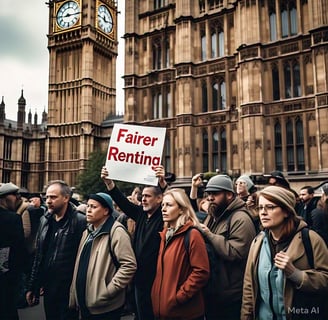Understanding the Renters Reform Bill: A Simplified Guide
Explore the upcoming changes in the UK rental market with this comprehensive overview of the Renters Reform Bill. Learn about the new guidelines on evictions, periodic tenancies, annual rent reviews, and pet policies, and understand the potential benefits and challenges for all parties involved.
HMOINVESTMENTINVESTMENT PROPERTYPROPERTY MANAGEMENTLETTING AGENTMIDDLESBROUGHSUNDERLANDDURHAMDARLINGTONTEESSSIDENEWCASTLECO DURHAM
Ranjan
3/10/20254 min read


Understanding the Renters Reform Bill: A Simplified Guide
Imagine waking up one day to find out your landlord wants you out in just two months—not because you've done anything wrong, but simply because they plan to sell the property. This unsettling scenario, known as a “no-fault eviction,” is all too common for many renters in England. The upcoming Renters Reform Bill, expected to become law in 2025, aims to change that by creating a fairer system for both tenants and landlords. Let's break it down in plain language with some everyday examples.
What Is the Renters Reform Bill?
Think of the Renters Reform Bill as a fresh set of rules for renting in England. Its main goal is to protect you from unfair treatment while also giving landlords clear guidelines. It’s all about striking a balance—ensuring tenants enjoy more stability while landlords have straightforward rules to follow.
Key Changes in the Bill
No More “No-Fault” Evictions (Goodbye, Section 21!)
Currently, landlords can evict tenants without a reason under Section 21 of the Housing Act 1988. For instance, if a landlord decides to sell, you could be forced out even if you've always paid your rent on time. The new bill scraps this rule, meaning landlords will now need a valid reason—such as unpaid rent or property damage—to evict someone. (UK Government: Renters' Rights Bill Guide)Example: Sarah, a college student, rented a flat for two years until her landlord suddenly issued a Section 21 notice because he wanted to renovate. With the new rules, he’d have to prove that the renovation genuinely required her to leave, giving her a fair chance to contest the decision.
Rolling Monthly Contracts (Periodic Tenancies)
Instead of being locked into a fixed 12-month lease, your rental agreement will automatically renew every month. This change gives you the flexibility to leave with just two months' notice, rather than being stuck in a long-term contract for a subpar home. (NRLA: Balanced Reforms)Example: After finishing university, Jay wants to move closer to his new job. Under the old system, he might have been stuck until his lease ended. Now, with monthly renewals, he can simply give two months' notice and move on.
Fairer Rent Rules
Landlords will only be allowed to increase rent once a year. Plus, if you believe a rent increase is unreasonable, you can challenge it through a tribunal—a kind of small claims court for housing issues. (Nicholas Jones: Landlord Questions)
Example: Mia experienced a sudden £200 monthly rent hike. Under the new rules, her landlord can only raise the rent once a year, and she can request a tribunal review if the increase seems too steep compared to similar properties.Pet-Friendly Homes
If you’d like to keep a pet, the bill makes it easier to request permission. Landlords can’t simply refuse without a solid reason—like a specific allergy or a clause for shared accommodation. (Propertymark: Understanding the Renters' Rights Bill)Example: Tom is excited about adopting a dog but worries his landlord might say no. With the new rules, he can formally request to keep a pet, and if the landlord declines, they must explain their reasoning.
Pros of the Renters Reform Bill
For Tenants:
No More Surprise Evictions: You'll be less likely to be unexpectedly forced out of your home.
Better Quality Homes: Landlords will be required to address issues like mould or broken heating. (Propertymark: Understanding the Renters' Rights Bill)
Transparent Rents: With bidding wars banned, rent prices should remain fair and clear. (UK Government: Renters' Rights Bill Guide)
For Landlords:
Clearer Procedures: The bill sets out explicit rules for eviction, potentially reducing disputes and streamlining the management of challenging tenancies.
(Parliamentary Evidence on Anti-Social Behaviour)Enhanced Reputation: Adhering to transparent and fair practices can help build trust with your tenants, leading to longer and more stable tenancies.
(UK Government: Renters' Rights Bill Guide)Support Systems: The introduction of a new Ombudsman to resolve disputes swiftly may protect you from lengthy legal battles.
(UK Government: Renters' Rights Bill Guide)
Cons of the Renters Reform Bill
For Tenants:
Fewer Rentals Available: Some landlords might choose to sell their properties rather than comply with the new regulations, which could lead to a reduction in available rental options for tenants.
Potential Rent Hikes: In order to cover the costs of meeting new standards, such as the Decent Homes Standard, landlords might increase rents, which could put additional financial pressure on tenants.
For Landlords:
Increased Administrative Burden: Enhanced processes for evictions and tenant management may lead to more paperwork and tighter regulatory compliance. (NRLA: Balanced Reforms)
Potential Financial Implications: Restrictions on rent increases and the possibility of tenants challenging adjustments could affect your ability to respond to market changes. (Nicholas Jones: Landlord Questions)
More Frequent Turnover: With rolling monthly contracts, you might have to secure new tenants more often, which can be both time-consuming and costly if vacancies occur. (NRLA: Balanced Reforms)
What Happens Next?
The bill is expected to pass in 2025, with the following stages:
2025: Section 21 is abolished and monthly contracts begin.
2026: The Decent Homes Standard is enforced and rental bidding is banned.
2027: The Landlord Ombudsman and database become fully operational. (UK Government: Renters' Rights Bill Guide)
Conclusion
The Renters Reform Bill is set to become a safety net for tenants and a clear guide for landlords. While it might bring some challenges—such as the potential for rent hikes or a reduction in available rentals—it promises a fairer, more secure system for everyone. For young people especially, it means more stability and fewer unexpected surprises when it comes to renting a home.
